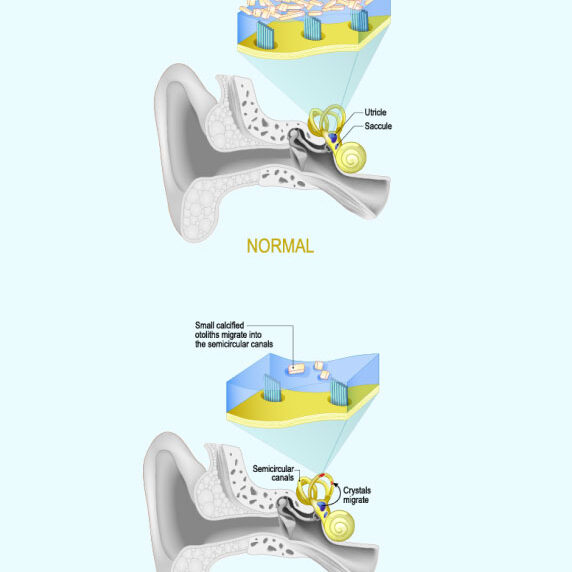Definition
Vertigo is a condition characterized by a sensation of spinning or dizziness, where it feels like you or your surroundings are moving or rotating when, in fact, they are not. Vertigo can be caused by various factors and can significantly impact a person’s balance and daily activities.
If you have ever experienced dizziness, chances are you’ve had vertigo, or a form of vertigo. Vertigo is a symptom of an inner ear or brain disorder that affects your balance or sense of rotation, which is caused by a disturbance in the ear or brain which results in a feeling of spinning or moving. In such conditions, you should consult with an ENT Specialist for Vertigo.

Causes of Vertigo
Vertigo can result from multiple underlying causes, including:
Benign Paroxysmal Positional Vertigo (BPPV): Tiny calcium particles in the inner ear can become dislodged, leading to vertigo.
Meniere’s Disease: A disorder of the inner ear that affects balance and hearing.
Vestibular Neuritis: Inflammation of the vestibular nerve, which controls balance.
Labyrinthitis: An inner ear infection or inflammation that affects balance.
Migraines: Some individuals experience vestibular migraines with vertigo as a symptom.
Medications: Certain medications can cause vertigo as a side effect.
Head Injuries: Traumatic brain injuries or concussions can damage the inner ear or brain structures responsible for balance.
What are the Different Types of Vertigo?
Peripheral vertigo is associated with problems in the inner ear. The vestibular system sends signals to the brain about the position of your head in relation to movement, enabling you to keep your balance and maintain equilibrium. When these signals are disrupted, vertigo results. This is often caused by inflammation related to a viral infection and is commonly associated with two conditions: labyrinthitis (inflammation of the inner ear’s labyrinth and vestibular nerve), and vestibular neuronitis (inflammation of the vestibular nerve).
One of the most common causes of vertigo is a disruption in the signals sent from the vestibular system to the brain. When this occurs, it can cause us to feel off-balance and confused about where we are and what direction we’re facing.
The vestibular system is made up of three parts: the semicircular canals, which detect motion; the utricle and saccule, which detect gravity; and the vestibular nerve, which sends signals back to the brain after receiving information from each of these parts. Because of this complex structure, there are many different types of vertigo that can result from problems with it:

Vertigo Symptoms and What They Mean?
Vertigo is a symptom that can be caused by a variety of conditions. Vertigo is characterized by a sensation that you or the room are moving or spinning. This may be accompanied by additional symptoms such as nausea, vomiting, hearing loss, tinnitus, difficulty focusing or moving the eyes, double vision and a feeling of fullness in the ear.
Some Vertigo symptoms are listed below:
Spinning Sensation: A false sense of spinning or movement.
Nausea: Feeling nauseous or vomiting, especially when the vertigo is severe.
Sweating: Profuse sweating, particularly during vertigo episodes.
Loss of Balance: Difficulty maintaining balance and coordination.
Ringing in the Ears: Tinnitus, or ringing in the ears, may accompany vertigo.
Hearing Loss: Temporary or fluctuating hearing loss in some cases.
Vertigo Treatment
Treatment varies depending on the type and severity of vertigo. Some forms disappear without treatment, while others require medications or physical therapy to manage symptoms. The most common type, BPPV, responds well to head maneuvers, while other types are successfully treated with medication. When the condition persists, physical therapy can help..
The symptoms of this medical condition can be unpleasant and debilitating to regular daily life. However, with Dr. Ram as your vertigo treatment specialist, you can be confident that the condition will not continue to affect you any longer. We diagnose and treat all types of vertigo causes so that you no longer have to worry. Visit Dr. Ram ENT hospital and book an appointment or call now.
Management and Prevention:
Fall Prevention: Be cautious to prevent falls during vertigo episodes, especially in older individuals.
Limit Triggers: Avoid any known triggers, such as certain foods, that worsen vertigo.
Stay Hydrated: Dehydration can exacerbate vertigo, so maintain adequate fluid intake.
Stress Management: Stress reduction techniques can help reduce the frequency and severity of vertigo episodes.
Summary
Vertigo is a condition characterized by the false sensation of spinning or dizziness and can result from various underlying causes. Symptoms include spinning sensations, nausea, sweating, and loss of balance. Treatment options depend on the specific cause and may involve rehabilitation, medications, repositioning maneuvers, dietary changes, or surgery. Managing and preventing vertigo involve fall prevention, trigger avoidance, adequate hydration, and stress management.
Suffering from recurring vertigo episodes?
You don’t have to let vertigo disrupt your life any longer. At Dr. Ram ENT Hospital, our specialized team of experts can diagnose the root cause of your vertigo and develop personalized treatment plans to alleviate your symptoms.



